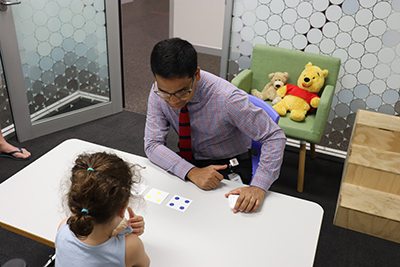Mater Researcher neurodevelopmental follow-up specialist, Associate Professor Samudragupta (Sam) Bora co-leading a ground breaking research project investigating opportunities to inform early intervention for premature babies called PREdiction of childhood Brain Outcomes in infants born preterm using neonatal MRI and concurrent clinical biomarkers: The PREBO-6 Study.
There has been great progress worldwide in helping babies born before 32 weeks gestation to survive but Associate Professor Bora says more needs to be done to support their optimal development and provide a better quality of life.
“Very preterm babies, who are born before 32 weeks gestation and extremely preterm babies born before 28 weeks gestation are at higher risk of cognitive, language, motor and socio-emotional challenges than their term-born peers,” Associate Professor Bora said.
“Children can have difficulty forming intimate relationships and may struggle developing their language skills as they grow up. This may have a significant impact on their ability to function in society, and can lead to a long-term burden on the children and their families.”
Associate Professor Bora is investigating what can be done to improve the quality of life for these vulnerable children born very or extremely preterm.
Along with PREBO-6, he is leading multiple studies to develop a better understanding of the long-term neurodevelopmental outcomes of babies born preterm.
“My team and I are aiming to improve the utility of early (32 weeks post menstrual age) neonatal magnetic resonance imaging (MRI) to identify risk of neurodevelopmental impairments at an early stage in a child’s life,” Associate Professor Bora said.
“The advancement of MRI technology has led to an increase in the amount of information available to us about a baby’s brain. This study determines how this information can be used to predict which children are at risk of abnormal development.
“Abnormalities in neonatal white matter, the part of the brain that allows other parts to communicate, have been shown to be associated with cognitive problems in preterm children.”
For Associate Professor Bora and his team the good news is, prematurity leads to high prevalence but low severity neurodevelopmental problems in the vast majority; these mild delays/deficits are more likely responsive to early intervention that can lead to dramatic improvements in a child’s quality of life.
The ongoing research will help identify which babies are vulnerable to developmental impairment.
As a result, clinicians can target those children, starting early interventions to improve their ability to function as well as reduce the impact on their life, and the life of their parents.

The study is still very valuable as it will provide a means for risk stratification for early intervention therapies and targeted enrolment for post-NICU discharge new therapies and provide more accurate prognostic counselling for parents and guardians.
Parent Tim* whose child Lily* was born at 30 weeks and spent 12 weeks in a Neonatal Intensive Care Unit has been participating in the study.
“So far Lily has been meeting all her developmental milestones however the study is providing an additional level of assurance to me and my family that there are no underlying issues,” Tim said.
“I could not afford to pay for MRI’s or these types of tests on an ongoing basis so this is providing me with peace of mind. I am also able to consult with the doctors when I have questions about Lily’s development.
“This is a very friendly, reassuring and comforting space to be in. I know if anything was picked up with Lily I would be able to address it quickly and with expert help from these clinical teams.”
Associate Professor Bora ’s study is currently in its third year and will continue until 2023 so that they have collected data from a sizeable number of ex-preterm study participants for scientifically robust and clinically meaningful conclusions.
Associate Professor Bora is the Group Leader of Neurodevelopmental Follow-Up and Outcomes at Mater Research, The University of Queensland, and the elected Chair of Long-Term Outcomes of High-Risk Babies Subcommittee of the Perinatal Society of Australia and New Zealand.
*Names have been changed for patient privacy.